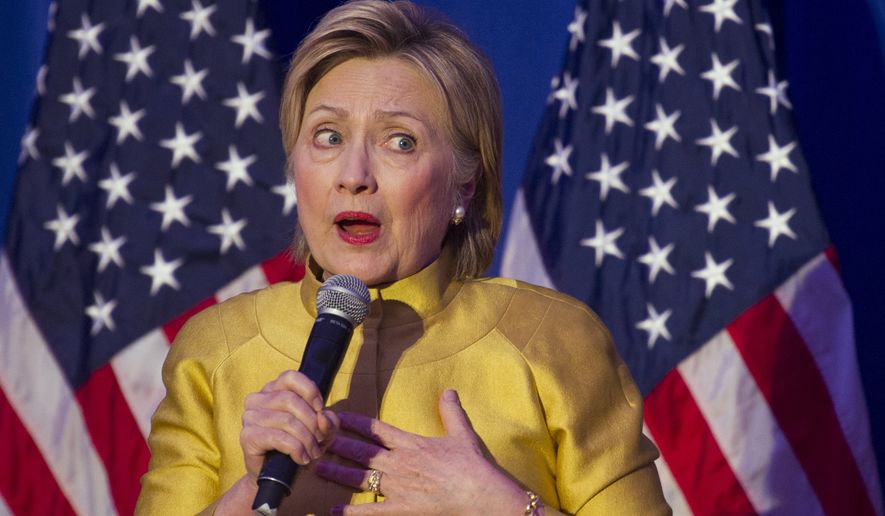Hillary Clinton has been the likely 2016 Democratic presidential nominee for four years, yet she’s still struggling to solidify herself — and even upstart Republican Donald Trump has surpassed her, clearing away all 16 of his opponents in less than a year.
Mrs. Clinton’s loss in Indiana’s primary on Tuesday probably won’t derail her from being her party’s nominee, but it does mean she’ll have to spend more time fending off Sen. Bernard Sanders over the next month.
The Clinton campaign is trying to ignore Mr. Sanders and look ahead to the general election, but the Vermont senator is unwilling to let her out of the ring. Indeed, he renewed his challenge Wednesday to square off in yet another debate with Mrs. Clinton ahead of the June 7 primary in California.
“It is ironic that Trump has sealed the nomination deal before Clinton. With the Cruz dropout and Sanders continuing to win primaries, it will be awhile before Clinton is able to unify the Democratic Party. In the short-run, this will complicate her efforts to pivot to Trump,” said Darrell M. West, director of governance studies at The Brookings Institution.
By this point in the race, Mrs. Clinton surely expected to be in Mr. Trump’s position — alone atop her party and able to take aim at Republicans who she expected to be mired in a messy primary fight.
But Mr. Trump’s win in Indiana Tuesday knocked Sen. Ted Cruz and Ohio Gov. John Kasich out, leaving the billionaire businessman certain to win the nomination on the first ballot at the GOP’s convention in Cleveland in July.
Mrs. Clinton, by contrast, will likely have to rely on superdelegates to claim the Democrats’ nomination, and those can switch their vote, meaning she won’t seal the deal until the Democratic convention in Philadelphia in July.
And Mr. Sanders has said he’ll make her compete for every vote.
“The Clinton campaign thinks this campaign is over, sisters and brothers. They are wrong. Maybe it’s over for the insiders and the party establishment, but the voters in Indiana had a different idea,” the senator said in an email to supporters Wednesday. “We have an uphill climb to victory, but we have been fighting uphill from the first day of this campaign. I am in this campaign until the last vote is cast.”
Mr. Sanders also said he expects Mrs. Clinton to agree to a time and date for a debate in California later this month. Months ago, Mrs. Clinton had agreed in principle to a California debate, though she likely expected to have pushed Mr. Sanders out of the race before the forum took place.
While some progressive groups are beginning to launch aggressive anti-Trump advertising campaigns, others are still focused on boosting Mr. Sanders and making Mrs. Clinton’s road to the nomination as difficult as possible.
“In the days and weeks ahead, the political revolution is going to continue winning states, winning delegates, surprising skeptics and ensuring that our call for populist progressive change is heard loud and clear in Philadelphia,” said Charles Chamberlain, executive director of the liberal group Democracy for America.
Mrs. Clinton seemed intent Wednesday on not being derailed, even after her loss. She didn’t speak Tuesday night and didn’t address the Indiana result on Twitter.
Instead she took to television Wednesday, telling CNN she’s been prepping for Mr. Trump and welcomes the general election. The interview largely ignored Mr. Sanders and focused entirely on the looming battle between Mrs. Clinton and Mr. Trump.
“He’s a loose cannon,” she said of Mr. Trump. “I mean, he’s somebody who has said so many things, and I’m sure he’ll be scrambling and his advisers will be scrambling, but he’s already said all of these things. He says climate change is a Chinese hoax, and I think it’s real. We’ve got to pull the world together to deal with it. So you can go down a long list, some of which he’s tried to bob and weave a little bit, but I think it’s a risk. I think he is a loose cannon, and loose cannons tend to misfire.”
But Mr. Trump will have one advantage in a general election. Specialists say Mrs. Clinton’s decades of experience in public life — including two terms as first lady, eight years as U.S. senator from New York and four years as secretary of state — have worked against her in this election cycle, while outsider status has worked in favor of Mr. Trump and Mr. Sanders.
“There is this deep anger at anything that smacks of politics as usual. It was telling that the last two candidates standing with a real chance [on the GOP side], Ted Cruz and Donald Trump, both had established themselves as the two so-called anti-establishment candidates,” said Matthew Dallek, assistant professor of political management at George Washington University. “And on the other side, Sanders has done much the same. Part of the phenomenon is that people underestimated the kind of anger on the left and the right a sense that there are structural problems that have been long in the making in this country.”
• Stephen Dinan contributed to this report.
• Ben Wolfgang can be reached at bwolfgang@washingtontimes.com.




Please read our comment policy before commenting.